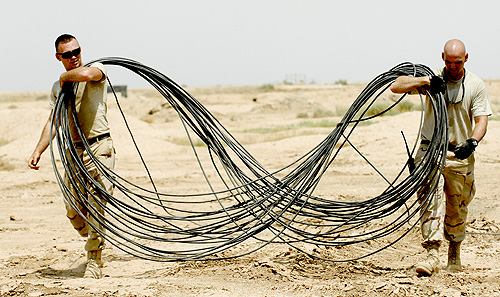
How is the war in Iraq unlike any prior war America has waged? The course of the war has been strange. It went from invasion, to declaration of “mission accomplished,” to a quickly concluded occupation at the end of June 2004. Today there are more American soldiers in Iraq than there have ever been, facing more dangerous conflict. Their actual mission is confusing and vague, and the Iraqi Government–which all of this was supposedly designed to stabilize and make self-sustaining–has essentially collapsed. All of this is unlike any of our prior military experiences, and all of it reflects a catastrophic failure of planning and design at the highest leadership levels—and not a failing by soldiers on the ground to accomplish the tasks set before them.
Still, arguably the biggest change in this war is the force configuration. The number of Americans serving in uniform in Iraq today is approaching 170,000. The number of persons serving in a contract capacity in Iraq is about 180,000. Historically, contractors have been 3-5% of the uniformed force. So this marks a radical transformation, carried out by Rumsfeld’s Pentagon. There was no public discussion of this. No public buy-in. No Congressional consent. In a series of appearances before Congress, Pentagon spokesmen continuously misstated the number of contractors or claimed—incredibly—that they had no firm count. Even today, notwithstanding tremendous Congressional pressure to get a firm grip on the contractor count, there is uncertainty about the numbers.
The New York Times looks at this issue today and takes a very cautious approach to the numbers. It says, for instance, that the military puts the number of contractors at 125,000. That number is low. And the Times lost sight of the fact that a very large part of the total is contracted not to the Department of Defense, but to other agencies, including the Department of State, the U.S. Agency for International Development, the Department of the Interior, the Department of Commerce and the Department of Justice. But the Times very appropriately focuses in on the new phenomenon of the contract soldier and it presents the phenomenon in a tragic setting: one of the more than 1000 American contractors killed in Iraq.
Brenton Thomas Gray was no longer a soldier when he died a soldier’s death last August on a northern Baghdad road. There were an armored car, a curbside bomb, a sizzling explosion. The sky went black with smoke and melting tar. Mr. Gray, 34, was a private security expert, a navigator for the Baghdad team of Cochise Consultancy, and one of the thousands of men who earn their paychecks in Iraq, living on their wits and carrying a gun.
Military officials estimate that 125,000 contractors are working in the country, nearly the number of American troops. The figures on those who carry guns vary widely, depending on the source, but seem to settle on about 20,000. As of June 30, government figures show, 1,001 contractors had died in Iraq since the start of the war. A eulogy is spoken by tradition at the burial, but the story of a life is just as likely to be spoken in a bar. Mr. Gray’s family took that path last week, marking their year of grief by visiting his grave, then visiting a pub.
Dying in a country far from home is a contractor’s lot, but so is being branded a mercenary, a cowboy, a soldier of fortune, said some of the men who attended the gathering on Saturday in this humid town of horse farms 40 miles northwest of Fayetteville. The pay is good, they said, though there are reasons beyond the monthly check to work, as they call it, downrange in danger’s way. “Yeah, you can make a buck,” said Wayne Colombo, a white-haired warrant officer who, well before he worked with Mr. Gray, served with a Special Forces A-team in Vietnam. “But you’re also back with guys you know, doing what you can — and doing what you know.”
From the birth of the nation through the arrival of George W. Bush, the United States has nurtured the ideal of the citizen soldier. But that concept has been demolished by Bush’s dynamic duo of military planning, Donald Rumsfeld and Dick Cheney. Perhaps it’s time to have some public discussion about the emergence of the new concept of private commercial military service.


